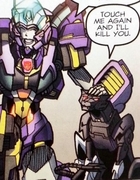|
Could you link your reviews of the modules purple?
|
|
|
|

|
| # ? May 23, 2024 12:02 |
|
sebmojo posted:Could you link your reviews of the modules purple? Found 'em.
|
|
|
|
sebmojo posted:Could you link your reviews of the modules purple? https://writeups.letsyouandhimfight.com/purplexvi/dragonlance/ The excellent archive maintainer has also included Libertad's extra information about the 3.x version.
|
|
|
|
What are some examples of RPGs that
I've been playing a lot of Star Renegades and Ruined King lately, and I've been thinking about that kind of weighty decision space where characters don't really move around in combat. I'm okay with #2 having the teeniest bit of positioning (front line versus rear guard, "high ground" status, or somesuch), but otherwise no spatial positioning. D&D 3.X's "you can totally play this theater-of-the-mind" don't count - the game should strongly assume no positioning, but also, be pretty crunchy.
|
|
|
|
Exalted springs to mind.
|
|
|
|
CitizenKeen posted:What are some examples of RPGs that Flying Circus immediately jumps to mind.
|
|
|
|
CitizenKeen posted:What are some examples of RPGs that We have such Burning Wheels to show you. 
|
|
|
|
I've played Torchbearer, so I think I can guess how Burning Wheel feels, right? That's a good example. I adore Flying Circus, I probably didn't think of it because I'm in a "warrior with comically large sword" frame of mind, not "planes". I've never read Exalted - is it entirely ToTM?
|
|
|
|
CitizenKeen posted:What are some examples of RPGs that I'm cheating because there are zones, but the zones are very simplistic and my gameplay experience of it didn't have much to do with zone positioning, especially when it came to crunch level: Legends of the Wulin. Lots of mechanically detailed fights without moving around except in terms of narrative flourishes.
|
|
|
|
CitizenKeen posted:I adore Flying Circus, I probably didn't think of it because I'm in a "warrior with comically large sword" frame of mind, not "planes". There's probably a pilot out there whose called their plane 'Comically Large Sword' so it works. I only recently discovered Flying Circus myself and it rocks. Even picked up the Horrors From the Heights supplement on sale last week.  Also I love this picture because it absolutely looks like the Fisherfolk pilot is listening to Golden Earring's 'Radar Love' in her head.
|
|
|
|
CitizenKeen posted:I've never read Exalted - is it entirely ToTM? It has been a while since I last tangled with Exalted, but as I remember it, it's theoretically all Theater of the Mind, but there are absolutely some powers that are rendered irrelevant that way because their wheelhouse is related to moving large distances quickly or ignoring distances, etc. That's for Exalted 2e, in any case, 3e may be different. CitizenKeen posted:What are some examples of RPGs that I think my personal thought on this would be either Godlike or Reign. ORE lends itself to having a decent amount of combat options and crunch without necessarily involving positioning.
|
|
|
|
CitizenKeen posted:What are some examples of RPGs that Does RuneQuest count? It's very crunchy with respect to the timing of actions, slicing turns into segments and having different actions cost a different amount, but it's loosey-goosey when it comes to positioning. But that could just be my impression from a combat and a half from the Quickstart for RQG.
|
|
|
|
Exalted 1 and 2 didn't make any allowances for grids, but gave everything in concrete yard measurements. Exalted 3 uses Zones. The One Ring has four "stances" only one of which means anything concrete in spatial terms, and it's all player-side. It's pretty cool.
|
|
|
|
Sentinels. Combat never gets more topographic than "Well, he's in the room and you're outside the room" and the mechanics are crunchy enough to feel like there's stuff to think about. You can also play as someone with a big honking sword (superheroes carry big honking swords all the time!).
|
|
|
|
CitizenKeen posted:What are some examples of RPGs that 2e AD&D, the one and only edition designed for theater of the mind (supplements like Combat and Tactics added grid combat mechanics though).
|
|
|
|
CitizenKeen posted:I've played Torchbearer, so I think I can guess how Burning Wheel feels, right? That's a good example. Torchbearer is the same general chassis as Burning Wheel, so it'll give you a good taste. But Burning Wheel has a lot more depth to it that Torchbearer wound up not porting over. A lot of Burning Wheel's crunch is in kind of nested subsystems of resolution so it can be a quick and dirty roll-off if it's not important or you can get into the weeds and use all of them if it's an important thing where the granularity is desired. If you use all the subsystems, a fight in Burning Wheel is intensely crunchy without getting really into positioning except at a very abstract level. Like, "my opponent is in full plate so I should halfsword my longsword to get the bind on their spear, then clinch and switch to a dagger" is not only a common level of crunch, but it's one the tactics get you to independently derive at the table. I like having the option of all that crunch, and it's good crunch, but it's also very good that you can turn it off and just have a Fight roll when you want that too.
|
|
|
|
Arivia posted:2e AD&D, the one and only edition designed for theater of the mind (supplements like Combat and Tactics added grid combat mechanics though). I'm trying to work out whether this was deliberate satire or just a very wrong take. 2e decided to keep almost all the baked in minatures rules from 1e right down to the appropriate measure of a fireball not actually being a radius spread but "approximately 33,000 cubic feet". AD&D 2e wasn't designed for theatre of the mind - it was designed for map and tape measure, the rules were almost unchanged - but it was suggested you ignore parts of the rules.
|
|
|
|
neonchameleon posted:I'm trying to work out whether this was deliberate satire or just a very wrong take. 2e decided to keep almost all the baked in minatures rules from 1e right down to the appropriate measure of a fireball not actually being a radius spread but "approximately 33,000 cubic feet". AD&D 2e wasn't designed for theatre of the mind - it was designed for map and tape measure, the rules were almost unchanged - but it was suggested you ignore parts of the rules. Huh? 2e systematically tosses out all the miniatures measurements (like the literal tape measurements in inches) for feet, yards and other Imperial theater of the mind measurements. It's not a great theater of the mind system, sure, but 2e is pretty clearly saying that the basic rules don't need miniatures or a grid, pushing that stuff off to Battlesystem and the like and then eventually it coming back in Combat and Tactics and stuff like JD Wiker's articles for Dragon where he's like "no seriously it does help." e: I just text searched the revised PHB and DMG, there's a note in the PHB that miniatures are helpful for figuring out positions in battle and that's it. In the DMG there is an optional system above and beyond the standard "tournament" system for doing aerial combat with miniatures. The only other results for miniature are spell components and magic items (a miniature chest for Leomund's Tiny Chest, for example). e2: in contrast, flipping through the 1e books has voluminous sections about measuring with tape, using miniatures, different scales, and mechanics such as size, flanking and facing are explicitly defined as using miniatures to determine scale and positioning. Arivia fucked around with this message at 20:05 on Mar 9, 2022 |
|
|
|
Both Trinity Continuum and Myriad Song use range bands (MS also has rules for a tactical map. Some rules, like the Push weapon descriptor and Stride action unfortunately don't make much sense when using range bands).
|
|
|
|
If the range bands are relative to a specific opponent (e.g., I am "near" this opponent but "far" from that one) then it doesn't meet the brief. I'm trying to think about how complicated a game can get without ever having to ask the GM where an opponent is.
|
|
|
|
CitizenKeen posted:If the range bands are relative to a specific opponent (e.g., I am "near" this opponent but "far" from that one) then it doesn't meet the brief. I'm trying to think about how complicated a game can get without ever having to ask the GM where an opponent is. I think it would help if you stated what questions are you willing to allow, unless I misunderstood.
|
|
|
|
Absurd Alhazred posted:I think it would help if you stated what questions are you willing to allow, unless I misunderstood. Fair, and I apologize. Like I said in the original question, I'm looking for games where there's no spatial positioning. Grids and zones, and I guess I should have included relative range bands. The source of the question is the style of video game where some people stand on one side of the screen, some people stand on the other. Where movement isn't part of the mechanical conversation. There are plenty of crunchy games that don't take into account morale, or conviction, or knowledge of your opponent, even though those three things have a non-negligible amount of impact (I assume) on the outcome of the fight. So, are there systems that are crunchy but don't take into account spatial positioning. I don't really see a difference between zones and range bands.
|
|
|
|
CitizenKeen posted:Fair, and I apologize. Like I said in the original question, I'm looking for games where there's no spatial positioning. Grids and zones, and I guess I should have included relative range bands. The source of the question is the style of video game where some people stand on one side of the screen, some people stand on the other. Where movement isn't part of the mechanical conversation. So you basically want the only question to be "is this person engaged in battle or not?" I will say, though, "too far away for melee" could be reskinned as a buff.
|
|
|
|
I think I get what you mean, but all combat games pretty much have to have at least one range band, i.e. “present in the fight”. Which I know sounds like I’m being a dick, but things like fleeing immediately make it central because that’s inherently range-based on at least some level even if it’s not physical. Like imagine a combat system about sympathetic magic : you still have de facto “range bands” they’re just not trying to model theoretical space because it’s a binary state between targetable and un targetable. Edit : lol, I’m not the only abstract math nerd.
|
|
|
|
I'm fine with range bands, as long as they're statuses and not relative. E.g., "I'm close to the fight" or "I'm far away from the fight", because those are mutually exclusive. Front line versus rear, etc. "I'm close to Avery" doesn't work, because I don't want a player to keep track of where they are for each ally and opponent. Does that make sense? Edit: And given the genre of games I'm looking at for inspiration, there's minimal difference between melee and ranged. Ranged can hit the "back row" in some games. I'm wondering if that's something players could accept - "I run all the way up and smack him, before fading back behind Blair."
|
|
|
|
CitizenKeen posted:I'm fine with range bands, as long as they're statuses and not relative. E.g., "I'm close to the fight" or "I'm far away from the fight", because those are mutually exclusive. Front line versus rear, etc. "I'm close to Avery" doesn't work, because I don't want a player to keep track of where they are for each ally and opponent. Does that make sense? I feel this only works in combat against Swarms or in firing line vs firing line combat. But Carnage Amongst the Stars does the former very well.
|
|
|
|
CitizenKeen posted:I'm fine with range bands, as long as they're statuses and not relative. E.g., "I'm close to the fight" or "I'm far away from the fight", because those are mutually exclusive. Front line versus rear, etc. "I'm close to Avery" doesn't work, because I don't want a player to keep track of where they are for each ally and opponent. Does that make sense? I don't understand how this excludes zones. Zones work by saying "Avery is in this zone and Claire is in that zone." You know Claire isn't near Avery (in the same zone) because you know what zone Claire is in and what zone Avery is in and that they're not the same zone. Having the binary state of "I'm in the front line" versus "I'm in the back line" works the same: if Avery is in the front line and Claire is in the back line, you know where Claire is relative to Avery because you know what respective lines they're in. Are you saying you're allowed to have two zones, but not three?
|
|
|
CitizenKeen posted:I'm fine with range bands, as long as they're statuses and not relative. E.g., "I'm close to the fight" or "I'm far away from the fight", because those are mutually exclusive. Front line versus rear, etc. "I'm close to Avery" doesn't work, because I don't want a player to keep track of where they are for each ally and opponent. Does that make sense? So basically, early Final Fantasy-style jrpg combat, where in a given combat encounter everyone can hit everyone and relative positioning is not a consideration outside of maybe "I'm in the back row so I take slightly less damage but melee attacks are weaker" sort of abstract buffs?
|
|
|
|
|
Vadun posted:I feel this only works in combat against Swarms or in firing line vs firing line combat. But Carnage Amongst the Stars does the former very well. I think you have to change you're starting assumptions. I've been getting really into Icon (the fantasy Lancer successor), and in Icon, there's no jump ability. You can't jump if your class doesn't have a jump ability. You're the world's greatest warrior and your enemy is standing on the other side of a five foot gulf? Too bad, they might as well be on the moon. I think there's an increasing comfort with rules that say "this is a game, we have rules to make the game mechanics fun, here's what you can and cannot do" and players are willing to play along with that. I think you could absolutely have a game where there was a conceit "everybody is near everybody else all the time always, because you're all just super awesome". But I was curious about the state of the art, as opposed to the what could be designed one day. Edit: Asterite34 posted:So basically, early Final Fantasy-style jrpg combat, where in a given combat encounter everyone can hit everyone and relative positioning is not a consideration outside of maybe "I'm in the back row so I take slightly less damage but melee attacks are weaker" sort of abstract buffs? Exactly. I'm curious what the tolerance is for that, especially in a crunchy game (I know there are lighter / PbtA style games where that's assumed, but I was curious about deep, mechanical weight).
|
|
|
|
CitizenKeen posted:I'm fine with range bands, as long as they're statuses and not relative. E.g., "I'm close to the fight" or "I'm far away from the fight", because those are mutually exclusive. Front line versus rear, etc. "I'm close to Avery" doesn't work, because I don't want a player to keep track of where they are for each ally and opponent. Does that make sense? I've found that with games where you track relative range between individual opponents (thinking 13th Age and Spectaculars), while they can theoretically be monstrously complex, in practice they usually collapse into a two-status system. You get a knot of people in melee range of each other, then some people orbiting around that in ranged attacking distance of the knot and each other. Front rank/back rank in all but name.
|
|
|
|
Arivia posted:Huh? 2e systematically tosses out all the miniatures measurements (like the literal tape measurements in inches) for feet, yards and other Imperial theater of the mind measurements. It's not a great theater of the mind system, sure, but 2e is pretty clearly saying that the basic rules don't need miniatures or a grid
|
|
|
|
CitizenKeen posted:I'm fine with range bands, as long as they're statuses and not relative. E.g., "I'm close to the fight" or "I'm far away from the fight", because those are mutually exclusive. Front line versus rear, etc. "I'm close to Avery" doesn't work, because I don't want a player to keep track of where they are for each ally and opponent. Does that make sense? I Am Just a Box posted:I don't understand how this excludes zones. Zones work by saying "Avery is in this zone and Claire is in that zone." You know Claire isn't near Avery (in the same zone) because you know what zone Claire is in and what zone Avery is in and that they're not the same zone. Having the binary state of "I'm in the front line" versus "I'm in the back line" works the same: if Avery is in the front line and Claire is in the back line, you know where Claire is relative to Avery because you know what respective lines they're in. Are you saying you're allowed to have two zones, but not three? |A|B|C|D|E| so to get from zone B to Zone D you need to at least nominally pass through A? Or could there be a hypothetical Zone Q off to one side? Because if the former all you need to know is that you are in zone B and your opponent is in zone D and the rest is trivial, while if Zone Q is around and moveable then you and the GM need to know "where" it is in relation to the others, and if it's fixed well now you just have a grid with extra steps. potatocubed posted:I've found that with games where you track relative range between individual opponents (thinking 13th Age and Spectaculars), while they can theoretically be monstrously complex, in practice they usually collapse into a two-status system. You get a knot of people in melee range of each other, then some people orbiting around that in ranged attacking distance of the knot and each other. Front rank/back rank in all but name.
|
|
|
|
Splicer posted:So something like: you're holding a Blue Weapon or a Red Weapon. People with Blue Weapons can only hit people with Blue Weapons, people with Red Weapons can hit anyone. If your side runs out of Blue Weapons then your Red Weapons become fair game by everyone. Your particular Blue Weapon guy might have a special ability that lets them take down a particular Red Weapon guy once per combat. Or you might be able to switch between Blue and Red Weapons at will. There could be a special Green Weapon category that does weird stuff, and so on. For convenience sake these weapons are called "Melee", "Ranged", and "Throwable". Sure! And some Blue Abilities can only be used in the front row. Or target all people n the front row. Or whatever. That's the kind of stuff I'm thinking of. It's possible that that level of play is only interesting in a computer game because you're controlling a team, and when controlling a single character maybe it isn't as interesting? I'm not sure, I was just curious how other games have handled it, because I did know of a few.
|
|
|
|
Would you consider Magic: The Gathering, as a whole, a combat system?
|
|
|
|
Tulip posted:Would you consider Magic: The Gathering, as a whole, a combat system? It's not really a role playing game, but yeah, I think Magic could scratch a similar itch perfectly.
|
|
|
|
Oh for sure it isn't, but it could be turned into one or a system of a larger RPG if you wanted to be insane
|
|
|
|
Arivia posted:Huh? 2e systematically tosses out all the miniatures measurements (like the literal tape measurements in inches) for feet, yards and other Imperial theater of the mind measurements. All of which does nothing to prevent there being hard distances in the system. 3.X uses the 1 square = 5 ft scale. And unlike 2e it doesn't make you try and work out the volumes of what is going on. These two things make 3.X quite simply a better theatre of the mind system than the one that uses imperial measurements (as both 3.X measurements also do) but that also wants you to work out literal volumes of spells (fireball) or that you can reflect off walls to line up bank shots (lightning bolt). quote:It's not a great theater of the mind system, sure, but 2e is pretty clearly saying that the basic rules don't need miniatures or a grid, And then it makes you make decisions that require exact details on a map. As a theatre of the mind system 2e doesn't even come close to 5e (and I wouldn't call that a good theatre of the mind system). With things like volumetric fireballs and bouncing lightning bolts I'd question whether 2e is even better than 3.0 or 3.5 quote:e2: in contrast, flipping through the 1e books has voluminous sections about measuring with tape, using miniatures, different scales, and mechanics such as size, flanking and facing are explicitly defined as using miniatures to determine scale and positioning. But without actually changing the rules this doesn't make 2e actually better for theatre of the mind than 1e. It just means that it can't tell the difference between theatre of the mind and half-arsing. Even 5e's theatre of the mind doesn't have the 2e nonsense that was left over from 1e.
|
|
|
|
neonchameleon posted:And then it makes you make decisions that require exact details on a map. As a theatre of the mind system 2e doesn't even come close to 5e (and I wouldn't call that a good theatre of the mind system). With things like volumetric fireballs and bouncing lightning bolts I'd question whether 2e is even better than 3.0 or 3.5 I mean, part of it is... when does the exact volumetric blast zone of a fireball matter? Like the main point of it is that if you toss it into a melee, it will also fry your own dudes, not just the enemy dudes. I don't think fireballs having a stated blast radius is necessarily the sick slam dunk against ToTM 2e that you feel it is.
|
|
|
|
CitizenKeen posted:Edit: I am compelled to mention TOR again (sorry if you addressed it already and I missed it). It's a little bit more complex "range"-wise than simply melee/ranged, but just barely.
|
|
|
|

|
| # ? May 23, 2024 12:02 |
|
Tulip posted:Would you consider Magic: The Gathering, as a whole, a combat system? There's a reason I keep coming back to the idea of an RPG that uses a preexisting TCG as it's combat system, albeit in a somewhat truncated form Tulip posted:Oh for sure it isn't, but it could be turned into one or a system of a larger RPG if you wanted to be insane I don't think it would be insane, just a lot of tinkering to get it into a form that isn't too sluggish
|
|
|




























